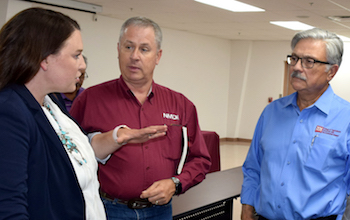 New Mexico Secretary of Agriculture Jeff Witte, center, and Rolando A. Flores, dean of the College of Agricultural, Consumer and Environmental Sciences, visit with Bonnie Hopkins, New Mexico State University Extension agricultural agent in San Juan County about the economic stress in the Four Corners region. (NMSU photo by Jane Moorman)FARMINGTON – Revitalizing and sustaining agriculture in the Four Corners region was the underlying concern for people attending the listening session hosted by New Mexico State University’s Cooperative Extension Service June 17 at San Juan County’s McGee Park.
New Mexico Secretary of Agriculture Jeff Witte, center, and Rolando A. Flores, dean of the College of Agricultural, Consumer and Environmental Sciences, visit with Bonnie Hopkins, New Mexico State University Extension agricultural agent in San Juan County about the economic stress in the Four Corners region. (NMSU photo by Jane Moorman)FARMINGTON – Revitalizing and sustaining agriculture in the Four Corners region was the underlying concern for people attending the listening session hosted by New Mexico State University’s Cooperative Extension Service June 17 at San Juan County’s McGee Park.
NMSU’s College of Agricultural, Consumer and Environmental Sciences Dean Rolando A. Flores and New Mexico Secretary of Agriculture Jeff Witte visited with agricultural producers to hear their thoughts on agricultural issues in the area.
“This is the third year we have held these listening sessions in the various regions of the state,” Flores said. “These sessions give us a chance to meet the producers and hear their thoughts about the industry’s needs.”
“These sessions give us the opportunity to hear the citizens’ concerns that we need to carry to Congress, federal administration, state legislature and to the general public at-large,” Witte said.
The generation of electricity has been an economic driver for the Four Corners region. With the potential of the Four Corners Generating Station power plant closing in 2022, community leaders are looking at diversification strategies in agriculture and manufacturing to sustain the economy.
“It’s a really scary time for a lot of people in this whole northwestern part of New Mexico, because everything is so unsure, but people find security in the things they know, and that usually brings them back to agriculture,” said Bonnie Hopkins, NMSU Extension agricultural agent in San Juan County. “It’s a lot of pressure on us to rebuild agriculture here.”
Most farmers in the San Juan/Animas river valleys are still working full-time and farm in the evenings to preserve their land and water rights for future generations, and because they are passionate about farming.
“Many of our farmers across the region aren’t showing significant profits,” Hopkins said. “Due to the big economic changes, our producers are more cautious, and may need more support to take on big projects. The diversification strategies we are looking at include ag-tourism, value-added products or manufacturing that includes agricultural products.”
A recurring issue at the listening sessions has been how to attract youth into the agricultural industry.
“When I was at NAPI, I worked with NMSU to have a succession plan, because I felt at the time that we needed people to replace our retiring workforce and managers,” said Tsosie Lewis, former executive director of Navajo Agricultural Products Industry. “I hoped the Navajo people would continue to operate NAPI and I worked with the colleges of agriculture, engineering and business to prepare our future managers.”
NAPI’s employment varies between 200 to 500 people during a crop season – 95 percent Navajos – for its operations on 72,000 acres of farmland. To date, NAPI’s education promotional program include summer internships and a scholars’ program. Student who have participated in NAPI Scholars Program have returned to NAPI as full-time employees.
“In the College of ACES we have about 2.3 percent Native American students,” Flores said. “This is very low. I want you to rest assured that while I’m dean of the college, we are focused on increasing the percentage of Native Americans’ enrollment in our college and university.”
In addition to these two NAPI programs, Flores talked about the Indian Resource Development program that the College of ACES administers.
“The program is a state legislature mandated program,” Flores said. “We have re-established an advisory board with one representative from three groups – Apache, Pueblos and Navajo tribes.”
One aspect of the IRD program is the DreamKeepers program, in which the college is introducing high school youth to careers in agriculture, business and engineering that they might apply in their tribal communities.
“This year we have 36, plus six advisers who were previous participants in the program,” Flores said. “Last year we had 22 students participate.”
The other issue on agriculture producers’ minds was a hot topic throughout New Mexico – hemp.
Witte talked about the various aspect of this crop, including the legal regulations.
Flores said that the college will be involved in genetics, planting and processing research; and the Extension service will be sharing this information gained through the research to those raising the crop. NMSU’s Agricultural Science Center at Farmington will be involved in the research.